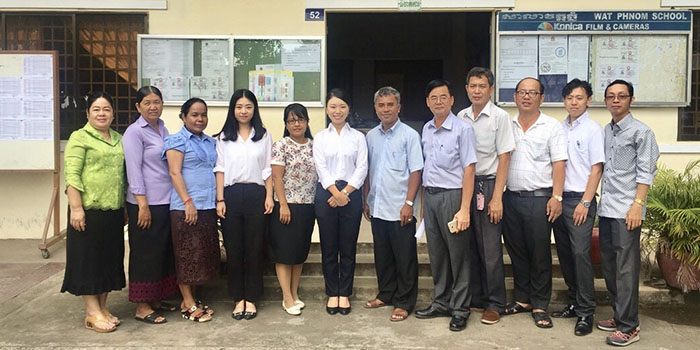Message from Ms. Mao Qi
Message to Potential Students: It is a great pleasure to write messages to potential students who plan to join Ogawa Seminar (zemi) in the near future. I must say I...
Graduate School of International Cooperation Studies (GSICS), Kobe University


From 4th to 22nd of September 2017, I conducted an internship at the Directorate General of Policy and Planning, Ministry of Education, Youth and Sport (MoEYS) in Cambodia. During this internship, I completed four main activities listed below:
In regard to the first activity, NFE is equally considered as a part of official education system in Cambodia, at the same level as the formal education, so that there are certain amount of data and policy papers about NFE in MoEYS. Through collecting and organizing these materials, especially the ones related to literacy education, I could gain deeper understanding of the policy and the situation of NFE in the country.
 For the second one, I visited two primary schools, two lower secondary schools and one community school in total. At primary schools and lower secondary schools, I helped out other interns to conduct their survey and interview. Although the contents were not related to my research topic, I could learn the situation of education in this country from broader perspectives. At community school, I observed one equivalency class which was operated for children who dropped out from or have not enrolled in schools. I distributed my questionnaire and interviewed girls aged 13 to 14 in the class. As the school is located in one of the poorest areas in Phnom Penh, capital city of Cambodia, most of their household turned out to be poor and even the interviewees who were still 13 to 14 years old had work after school to help their family. Furthermore, by conducting the survey, I found out that their parents also have low levels of education, and that what they learned at the community school has been contributing to improve their life to some extent.
For the second one, I visited two primary schools, two lower secondary schools and one community school in total. At primary schools and lower secondary schools, I helped out other interns to conduct their survey and interview. Although the contents were not related to my research topic, I could learn the situation of education in this country from broader perspectives. At community school, I observed one equivalency class which was operated for children who dropped out from or have not enrolled in schools. I distributed my questionnaire and interviewed girls aged 13 to 14 in the class. As the school is located in one of the poorest areas in Phnom Penh, capital city of Cambodia, most of their household turned out to be poor and even the interviewees who were still 13 to 14 years old had work after school to help their family. Furthermore, by conducting the survey, I found out that their parents also have low levels of education, and that what they learned at the community school has been contributing to improve their life to some extent.
Thirdly, I visited Provincial Office of Education (PoE) in Kampot Province and District Office of Education (DoE) in Chouck District. During the visit, I interviewed officers working there and teachers teaching in the province/district. PoE and DoE are carrying out their activities by following the policies decided by MoEYS, however, at the same time, decentralization has been promoted in Cambodia. Therefore, through the interview, I could capture the brief structure of education administration of this country, like how the central and the provincial/district level are collaborating to implement the policies. At the PoE in Kampot Province, I interviewed the officer who was in charge of NFE. A total of forty literacy classes are operated in the Province with available means; simply, because budget constraint is making it harder to scale up classes. Moreover, in terms of gender issue, the number of teachers and students at schools turned out to have an imbalance between men and women. As for the literacy classes, 70% of the participants were women, which means that women were far behind in terms of literacy. In addition, further information I gained through the interview about other activities of NFE, such as post-literacy classes, equivalency classes and income generation programs, helped me to capture the big picture of NFE at provincial level.
Lastly, in order to obtain the information about how international organization works in this country in terms of education, I visited UNICEF and UNESCO Phnom Penh Offices. UNICEF has been supporting education sector in collaboration with MoEYS, therefore, through the interview, I could understand how the government and international organizations are cooperating each other. As for UNESCO, it has been actively supporting literacy education from its federation. During the meeting with them, I obtained valuable information about their activities for literacy education, which would help me a lot for my future research.
Throughout the internship, I could deepen my knowledge about Non-Formal Education/literacy education in Cambodia. Moreover, I could build connections with not only MoEYS but also staffs from international organizations such as UNICEF and UNESCO. At the same time, I faced some difficulties, for instance, I learned how difficult it is to conduct survey and interview via translator. Including these difficulties, I strongly believe that every experience I had in Cambodia would definitely contribute to my future research and master thesis.
Last but not least, I sincerely appreciate His Excellency Lim Sothea and other officers at MoEYS, for accepting me as an intern and supporting me throughout the period. Also, I would like to express my gratitude to Professor Keiichi Ogawa, for giving me such a wonderful opportunity to conduct an internship at MoEYS and encouraging me during my stay in Cambodia.
Authored by Yuki NAKAMURA (Master Student)
Related Link
Ministry of Education, Youth and Sports in Cambodia